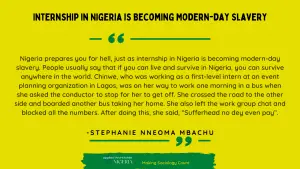In 1990, Nigeria was pronounced a sovereign state and this led to the Nigerian vision. A few meetings were held among the Nigerian parliament between June and October to decide what the vision and mission of this new combination of over 256 would be towards its people and the rest of
the world.
On October 7 after much deliberation, Prime Minister Sir, Tafawa Balewa led a team of Nigerian diplomats to the 15th United Nations General Assembly. Nigeria, newly admitted to the union as the 99th member; the prime minister gave a speech about what was decided after much deliberation from home about the vision and mission of the new country, for its citizens and the rest of the world.

The Prime Minister’s speech: “Last Saturday the country which I have the honor to represent, the Federation of Nigeria, became independent and assumed the rights and responsibilities of a sovereign State. Today Nigeria has been admitted to the United
Nations and assumes still more responsibilities. On behalf of my countrymen in Nigeria, I thank you all most sincerely for accepting us as a fellow Member of this organization. We are properly grateful for this recognition and for the generous friendly gesture made by so many Members who sent very distinguished delegations to join us in celebrating our accession to independence. I am particularly pleased that so many important representatives could come to Nigeria on that occasion because they will be able to inform their Governments of the genuine desire of Nigeria to have friendly relations with you all.”
He spoke extensively on each topic but I’ll summarise.
“First, it is the desire of Nigeria-as I have said already to remain on friendly terms with all nations and to participate actively in the work of the United Nations Organizations”
“Secondly, Nigeria, a large and populous country of over 35 million, has absolutely no territorial or expansionist intentions.
“Thirdly, we shall not forget our old friends, and we are proud to have been accepted as a member of the British Commonwealth. But, nevertheless, we do intend to ally ourselves as a matter of routine with any of the Power blocs. We are committed to upholding the principles upon which the United Nations is founded.”
Fourthly, Nigeria hopes to work with other African States for the progress of Africa. And to assist in bringing all African Territories to a state of responsible independence.
It is perhaps natural that I should speak about Africa first. We in Nigeria have been fortunate in achieving our independence without bloodshed or bitterness, and I hope that this will lend weight to the proposals that I am about to set before you.”
This speech drew a lot of excitement at the time about how gracious the speech was and how it was the perfect path for a prosperous Nigeria. However, looking back today, Nigeria has managed to hold onto some of these policies in the international community, by liberating and supporting many West African countries in times of their need.
For example, Nigeria was able to demonstrate its commitment towards Afrocentrism when Liberia was embroiled in two separate civil wars from 1989-1997 and from 1999 to 2003 before it ended.
According to Nigeria’s former chief of defense staff, Lucky Irabor, the Nigerian government spent about $8 billion to end the Liberian Civil War and restore peace in the country. When the Liberia internal crisis broke out in 1989, initially it started as a mere
conundrum, however when things escalated, the Economic Community of West African States (ECOWAS) bloc, consisting of 16 member countries, spearheaded a military action in August 1990.
Nigeria along with other Ecowas members deployed a collaborative military intervention force known as the Economic Community Monitoring Group (ECOMOG) to support the people of Liberia and to end the war, however, the peace wasn’t long
until the second civil war broke out in 1999. The Former Chief of Defence Staff also pointed out that Nigeria has significantly
contributed to 41 peacekeeping operations across the world, also noting that over 200,000 Nigerian troops have served in UN peacekeeping missions worldwide, a strong statement of Nigeria’s policy.
According to him “Since the first engagement of troops of our Armed Forces in the Congo in 1960, Nigeria has been unequivocally committed to the principles and objectives of the United Nations. It has significantly contributed to 41 peacekeeping
operations worldwide.”
“Similarly, under regional and sub-regional cooperation, Nigeria has been involved in peacekeeping operations in field missions in Cote d’Ivoire, Guinea-Bissau, Gambia, Liberia, Mali, Darfur, and Sierra Leone and has contributed a lot in terms of finance,
logistics, troops, and civilian experts, making her one of the most significant African troops and civilian police contributors to UN missions”
Why the Early Nigeria Vision failed
This approach of Afrocentrism is a good incentive for Nigeria in West Africa as she’s playing the role of a big sister, however, it was a time bomb waiting to blow because in protecting their foreign interests and supporting other West African nations, Nigeria
has neglected its primary duty which is to her citizenry.
The Nigerian government sent millions and billions during the independence era to aid African countries like Congo and Lyd while few to no developments are in place in the country nor was there a contingency plan to improve the country’s economic woes and looming over-reliance on natural oil.
The military appearance in the political scene also contributed a lot to the unrest as corruption, killings, and citizens oppression were the order of the day. Coups were the norm, as this not only set us further aback but took out National unison and patriotism in Nigeria because people started losing faith in Government policies, decisions, and operations.
How to Save the Nigerian Vision
For Nigeria to achieve its potential, it must adopt a citizens-first policy. Policies that favor both young and veterans and can improve their lives for a better future in the country.
According to the data, 5 out of 10 children are out of school while about 65% of the youths are without a job. This is a terrible stat regarding our territorial advantage, manpower, and wealth of natural resources at our disposal.
Electricity must also be addressed across states in the country to improve productivity and entice investors. Also, proper delegation of power to local governments should be a priority because they’re closer to the people at the grassroots level— the real people who deserve basic amenities and empowerment programs from the government.
The government should also empower Nigerian entrepreneurs, scientists, and every major industry in the country. The time is gone when our industry should be this messy and can’t have a say in the International science and technology communities. We should create more policies geared toward these things.
Take the Grammy for example USA, nominates artists from other countries to participate in their awards, all because their government invests in these things to make it truly global, giving the country revenue and more recognition. This
is just one of the many ways of putting the country on the map in Africa if Nigeria can
assume such a role.
In Conclusion
Egypt and Morocco are setting the bar very high for what was once a giant of Africa could catch up with. If the government wants to improve this country we must make Nigeria first and what does this mean? It means the Nigerian government must prioritize its citizens by working towards citizen |workers training in leadership, science, and economics policies. Programs should be created to sponsor citizens to other countries for collaboration and to learn new ways to improve our country’s economic growth and bring more development for all.







